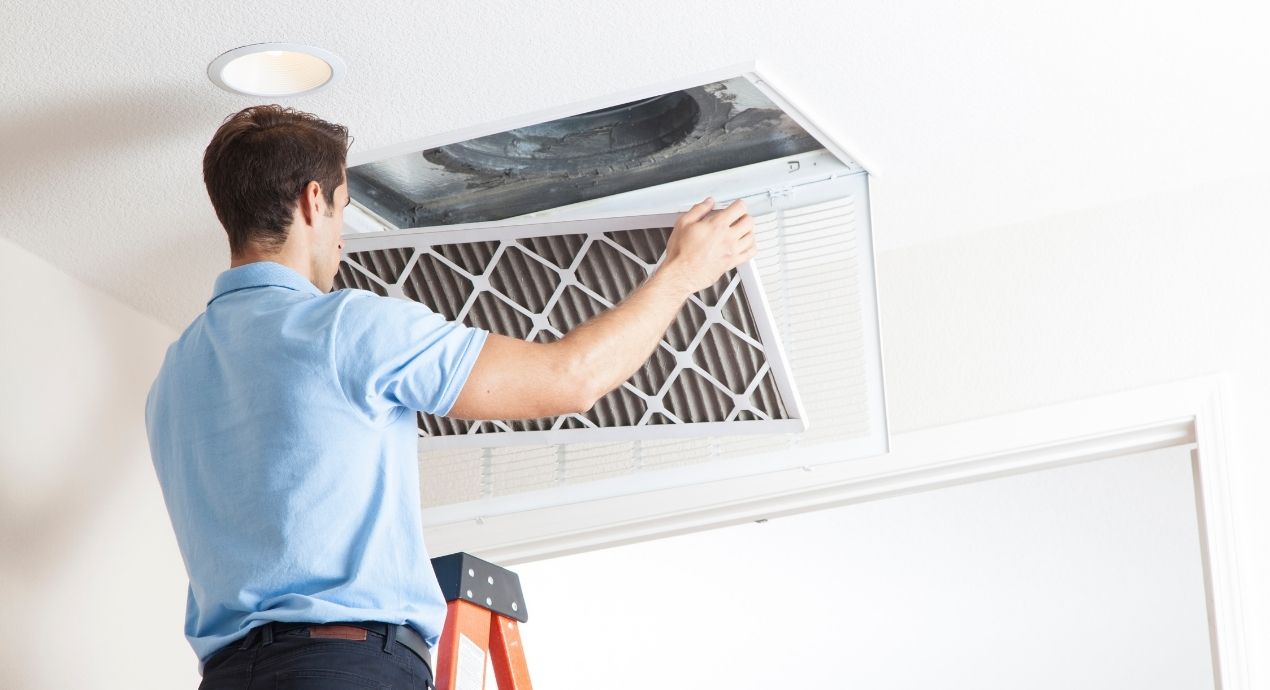
Contemplating coverage?
Subscribe to receive our emails & get
$200 off!
Have questions?
Call us: (833) 544-8273


Written By Ryan Merchant
Air quality is an environmental metric that the media is rightly paying more attention to. A recent study found that air pollution is responsible for upwards of 100,000 deaths in the United States every year, as fine particulate matter is a causal factor of respiratory disease, heart attack, and stroke. Polluted air also contributes to dizziness, headaches, chest pain, fatigue, poor sleep, and irritation of the eyes, nose, and throat.
Particularly concerning is that indoor air quality is not any better than outdoor air quality on average. In fact, the United States Environmental Protection Agency (EPA) has found that indoor air quality is often substantially worse. This is largely due to poor ventilation and the subsequent accumulation of contaminants indoors.
What can be done? While we may not be able to control the quality of the air outside, we can take steps to improve the air quality within our homes. A good air filtration system for home use is remarkably efficient.
In this article, we’ll review some common airborne contaminants and explain how a home air purification system works. We’ll also enumerate the most noteworthy benefits of an air purifier.
There's a reason Liberty Home Guard was rated the #1 Home Warranty
Service by U.S. News and World Report for 2021, 2022, 2023, and 2024. Check out our services.
Outdoor air pollution is caused by a variety of human activities, though some natural processes contribute to poor air quality as well. The biggest culprits are:
Clearly, the causes of air pollution are numerous. Considered together, their effects are compounded, and pressure systems and weather patterns cause especially high concentrations of contaminants in localized areas.
These microscopic contaminants permeate homes and buildings, where there are additional pollutants. According to the EPA, the most significant causes of indoor air pollution are:
In reasonable doses, many of these contaminants have a negligible effect on human health. The problem is that poor indoor ventilation allows gases and fine particulate matter to concentrate to unhealthy levels. An adequate filtration system is required to remove some of these pollutants from the air.
There are a few different kinds of air filtration systems. These systems generally use a fan to direct the flow of air, but there is variety in the mechanisms they use to purify the air once inside the system or appliance.
One very common type is the panel filter. This indoor air filter can be flat or pleated, much like the filters installed in automobiles. It traps dust and soot effectively, but microparticles and gases can pass right through.
Sometimes, panel filters are stacked together to create extended filters. These are a bit more effective and require less frequent replacement, but they’re still ineffective against gases and ultrafine contaminants.
Electronic filters are more expensive than traditional media filters, but they are much more efficient. Electronic filters leverage an electrical charge to attract microparticles much like a magnet attracts metal.
There are also UV filters that are especially effective against biological contaminants, such as bacteria and viruses. They use ultraviolet light to neutralize pathogens, and for this reason are quite common in hospitals.
Panel filters and electronic filters are common mechanisms in freestanding air filtration units. Manufacturers use all mechanisms in built-in units that can be integrated into a home’s HVAC system.
Now that we know what’s polluting our air and how air filtration systems operate, let’s review the most important benefits of a quality air purifier.
More than half of Americans report being bothered by allergies. For millions of people, airborne allergens are a perennial nuisance, and even people without allergies can be irritated by excess pollen, dander, mold spores, and dust. A good air purifier will remove these allergens from the air.
Some filters can also eliminate airborne bacteria and viruses. In other words, a good indoor filter can mean fewer colds and other contagious illnesses.
As outlined above, countless materials common around the home can release gases, chemicals, and other irritants. Radon is also unfortunately common, and the EPA estimates radon to be the primary cause of lung cancer in the nonsmoking population. Air filters can wick these pollutants from the air so they don’t wind up in your lungs.
Poor air quality exacerbates the symptoms of people with asthma and respiratory diseases. A good filtration system produces cleaner air, allowing sensitive groups to breathe more easily.
While air filtration systems benefit your health, there are also quality of life improvements to consider. A quality filter can quickly eliminate unwanted odors and cooking aromas, so your home will always smell fresh and clean.
Air purifiers have been shown to improve sleep quality. The elimination of airborne irritants means less coughing and throat clearing throughout the night.
If your air filter is integrated into your home, your HVAC system is your first line of defense against air pollution. You can ensure that it continues to operate smoothly with an HVAC home warranty. Liberty Home Guard’s System Guard and Total Home Guard plans include HVAC coverage. Call us at (866)-834-5570 and we’ll talk you through everything from ductwork repair to home warranty AC replacement. Our plans will take your breath away—in a good way.
Stay Ahead of Potential
Home Mishaps!
Subscribe to our Liberty Home Guard Newsletter and gain access to exclusive content that ensures your peace of mind.